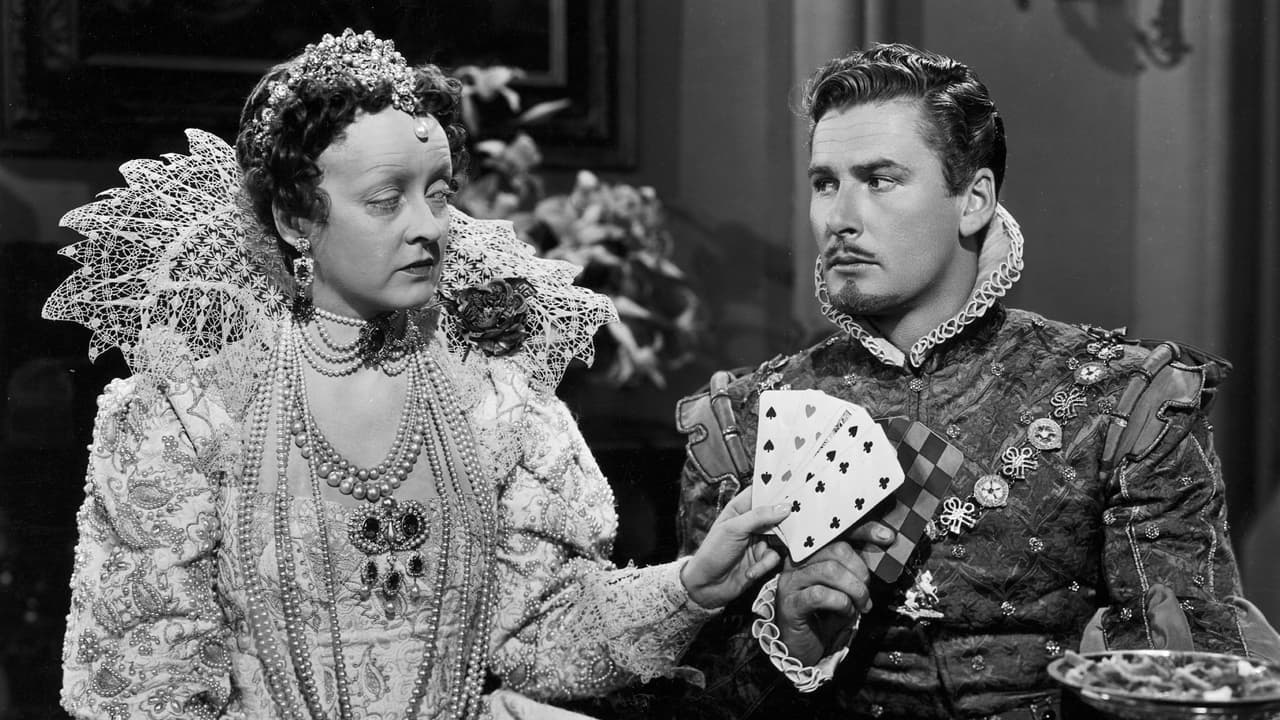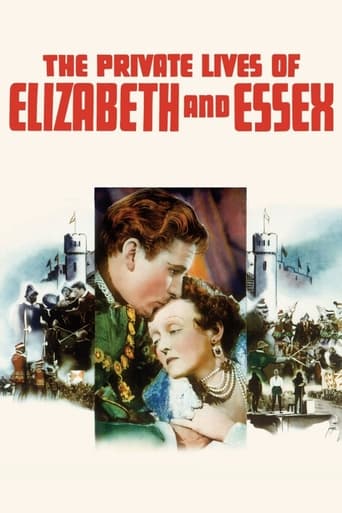

One of the best films i have seen
... View MoreLack of good storyline.
... View MoreAm I Missing Something?
... View MoreThrough painfully honest and emotional moments, the movie becomes irresistibly relatable
... View MoreThis is one of the rare color movies of the late 1930's, and the only one that Bette Davis made during her 17 years at Warner Brothers. Only in her 30's when she played the part, Davis became Queen Elizabeth, just as other actresses as worthy as her have done two or more times. But Davis, the Meryl Streep of her day, didn't get roles like this without struggle, and by 1939, she was a two time Academy Award winning actress, the most powerful woman in Hollywood, referred to by some as the fifth Warner Brother.One of several films in which she co- starred with both Errol Flynn and Olivia de Havilland, this film is nevertheless dominated by Davis's every move. Like the virgin queen, Davis is in command, and Davis uses every trick she knows to keep all eyes on her. In a year of four great films added to her resume, she makes Elizabeth seem so unlike there's any acting going on. Flynn and de Havilland get some good moments, with Vincent Price in a smaller role, and British history gets a nice screen presentation. Period detail all superb, given the Warner Brothers gloss and that sensational sound that only they could record.
... View MoreBette Davis stars in four major motion pictures released during the year 1939. However, this is the only one with Errol Flynn, which depending on one's point of view makes it either worth seeing or worth staying away from.Mostly, Miss Davis' costar is a capable actor, and anyone who may have doubts about that should look no further than his death scene as the Earl of Essex. Yet despite the solid production values, a rather entertaining script and the overall atmosphere of the picture, something seems slightly amiss. Perhaps it is because the two lead actors do not exactly register the sort of romantic chemistry this story requires.Olivia De Havilland, usually cast as Mr. Flynn's love interest in the studio's other costume dramas, is given the supporting part of Lady Penelope Gray. She has been underused in this spectacle, and her part could easily have gone to a lesser actress. Similarly underutilized is Vincent Price who does well with a small but significant role as Sir Walter Raleigh. As for Miss Davis and her brand of acting, she's intense, and she's certainly dramatic, but it is obvious she is playing the Queen of the Warners Lot more than she is playing Queen Elizabeth I. It would have been a vast improvement if her performance did not lack subtlety and if it contained real luminosity. Nevertheless, this film is often extraordinary in spite of Miss Davis and its other shortcomings, mostly because of Erich Korngold's wonderful score; the costumes; the set design; and the cinematography.
... View MoreTaking into account various period dramas of the 1930s and their 'interpretations' of history, PRIVATE LIVES OF ELIZABETH AND ESSEX appears to be unique at various levels. In that 'uniqueness,' it still arouses enthusiasm in film freaks. Initially titled THE KNIGHT AND THE LADY, it features for the second time a very interesting couple: Bette Davis with Errol Flynn. The former one was already associated with some best movies of the period while the latter one was at the height of popularity thanks to the still astounding portrayal of Robin Hood. Under Michael Curtiz's direction (still before his world fame with CASABLANCA), a solid period drama evokes where necessities of filmmaking transcend those of historical accuracy.Treated solely as a screen achievement and no basis for any history analysis, the film's greatest strengths lie in ACTING, MUSIC SCORE and VISUALS.ACTING: BETTE DAVIS: The dramatic resonance of the story is not achieved so well thanks to its source (a stage play by Maxwell Anderson) but, above all, thanks to the acting of great caliber by Bette Davis and her difficult (not to say doomed) collaboration with her male co-star. As Ms Davis openly loathed Mr Flynn from the very start of the production, it seems easier to have evoked contradictory emotions in her and prompt her to deliver that jungle of mixed 'make-me-love-hate-you before the camera. She both loves him and curses him, she seems to be perfectly appealing in her policy of ruling while alone and, at the same time, appears to be totally unable to exist without him. At times concentrated on the country, on England whom she calls in a purely patriotic line at the finale 'the most enduring love' of hers but, at other moments, solely focused on herself and the 'bitter aging mask' that makes her break all the mirrors in fury of not standing the sight of herself. Here, Bette Davis delivers an excellent contrast between and within a woman and a queen, the torments that truly gain sovereign control over her. That certainly affects the storytelling and a viewer. But in all that, Ms Davis manages to dominate our attention. The portrayal of the queen goes with her policy of peace which relies heavily on some other Hollywood productions of the time, including Garbo's 'interpretation' of the Swedish queen. Some lines about the nonsense of wars simply echo those ones in the 1933 MGM production (a note: Sir Laurence Olivier was going to be cast in both films....but...his leading ladies differed in the attitudes: Garbo appeared too cold in his arms while Bette Davis appeared too much after him...producers barely obeyed leading ladies' wishes). But this did not stop Bette Davis to portray a neurotic character in an excellent way.ERROL FLYNN: Because of the requirements of the drama and the inevitable focus on the queen, Robert Devereux, the Earl of Essex becomes a 'playboy' of the story who does not fully restrain the temptation of 'counting too much on queen's loves' (with reference to Lord Bacon's advice). He is hard to be tarnished by his enemies but someone who may easily eclipse the queen's popularity. In one lucid moment, he comes back triumphant from Cadiz and appears to be struck by the jungle of lies and deceit that he finds on the court. Foremost, however, he beautifully delivers torments at the queen's reaction who, actually, does not know if she hates him for making her love him or herself for needing him so much. His gentle, rather extremely subtle performance, though, does not remain 'eclipsed' by Ms Davis's totally but has its moments particularly worth attention.SUPPORTING CAST: In the role of Penelope, at the release of the film, OLIVIA DE HAVILLAND is another member of the cast who was widely popular among the audiences thanks to the fresh memory of GONE WITH THE WIND. In this rather genuine role of a queen's lady in waiting, she puts some feelings and heart to the harsh rules of the court, to the maliciousness of men in conspiracy and toughness of leaders. Above all, however, let me echo once again the aforementioned movie about Queen Christina. Doesn't the queen kissing Penelope on the lips make you think of Christina kissing Ebba? A very thought provoking parallel... Anyway, one among the supporting performers and the newcomers at the time is VINCENT PRICE in a very interesting and (unfortunately) hardly developed role of Walter Raleigh. He portrays an interesting and sophisticated character in some absorbing moments. Highly worth mentioning.MUSIC SCORE: Much of the dramatic touch of the movie is achieved thanks to Erich Korngold's score. It memorably reveals its triumphant moments, its romantic tunes and, in the most magnetizing way, the haunting flair to all. This beautifully corresponds to the emotions of the characters, to the changeable moods, to some bitter conclusions at the finale.VISUAL SPLENDOUR: Seemingly something we take for granted especially in the movies of that genre, camera-work, costumes, lights and shadows work perfectly in this film. Just a brief mention of the atmosphere of doom that is memorably prompted and evoked when drama reaches its crescendo should exemplify the enormous contribution of that aspect within the general mood of the film.Not for any greater glory of history on screen, but, undeniably, one of the most entertaining period pieces you may ever see. Despite the fact you may forget most of it after some time, it is really hard to skip in memory certain moments delivered by Bette Davis. A gem!
... View MoreBette Davis's Elizabeth is the best thing about this costume drama. Errol Flynn is a lightweight in comparison, but then again the queen was 30-plus years his senior. Davis embodies the realist queen in all her fierce intelligence and hair-trigger perception.She beautifully invokes the poignancy of a woman fiercely loyal to her people to the point of having to sacrifice the only man she ever loved. Yet the movie never really makes clear what she saw in him, other than a pretty face. Flynn seemed like a baby on the Irish battlefield and though I indeed found him handsome -- does anyone else see a resemblance to Kevin Kline? -- I didn't find him very interesting. However, it's clear that Elizabeth died spiritually when he did. What an amazing final scene!One minor aside: I'd hoped the movie would find a way to show at least a snippet of a play by the man referred to as "Master Shakespeare," but it never happened. (Though the drama herein would certainly have interested the Bard.) This movie leaves me curious to see the more modern version with Cate Blanchette...
... View More